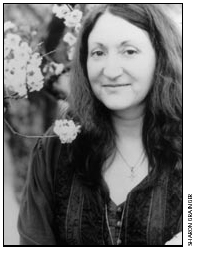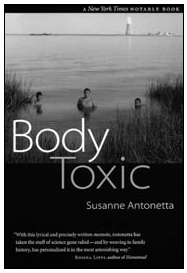|
Susanne Antonetta Susanne Antonetta was born in Georgia and raised in New Jersey. She is the author of three collections of poems, including Bardo, a Brittingham Prize winner. A portion of Body Toxic was published as an essay entitled "Elizabeth" that was declared a Notable Essay for 1998 by Best American Essays. Antonetta lives in Washington state with her husband and young son.
|
The Body Toxic An Environmental Memoir For readers of A Civil Action and Silent Spring, comes Body Toxic, a harrowing story of a family, a body, and a place-among the Pine Barrens of southern New Jersey, in one of the most environmentally contaminated counties in the country. Susanne Antonetta's family were immigrants from Italy on one side and Barbados on the other. They tried to realize the American dream by building a summer escape in the boglands of New Jersey, a place where the rural and industrial collide. They picked gooseberries along the chain-link fence of Oyster Creek Nuclear Power Plant, which ultimately released more radiation than Three Mile Island. They rowed dinghies along creeks contaminated with drums of toxic waste dumped illegally by various chemical companies. At the time, the young Antonetta and her cousins were obsessed with the threat of nuclear war, oblivious to what was going on around them. At first local officials began to warn people about their wells. Eventually, parents were asked to donate their children's baby teeth to be tested for radiation. One by one, Antonetta's family discovered they had an array of health problems, and that they were part of a larger pattern of health problems. Body Toxic merges the personal and familial with the historical, political, and environmental, creating a work that is intensely intimate and starkly political. Brave, harrowing, beautifully written, Antonetta's memoir explores an American family in the midst of the wreckage of the American dream. "[An] arresting memoir of a New Jersey girlhood lived in the shadows of the 20th century's most sinister molecules: the DDT, tritium, chloradane, benzene and plutonium that are now part of the American landscape.… Antonetta's considerable achievement in Body Toxic is to devise a literary voice for the people who live in such places, for bodies that have been 'charged and reformed by the landscape' of pollution.…Like any memoirist, Antonetta is mining her past in the hope of explaining the woman she became, but in this construction of self, chemistry largely takes the place of psychology.…What Antonetta has written is something new-a postpsychological memoir.…By the end of this dark, disturbing book, you realize Antonetta has posed a challenge to our prevailing notions of science and journalism and even literary narrative.…Why not construct a childhood from the influences of loosed electrons and chemicals 'fretted into our DNA' rather than the stuff a shrink can pry out? Science has been moving into this territory for some time now; Antonetta's aim in her 'environmental memoir' is to take literature there, too. It is a testament to her fearlessness and talent that she has largely succeeded." -Michael Pollan, The New York Times Book Review "Bittersweet and spiked with startlingly poetic descriptions, Antonetta's compelling blend of family history and musings on crimes against nature in the nuclear age opens a new chapter in the literature of place and offers a fresh and poignant look at the old story of inheritance." -Booklist Counterpoint
Press |

